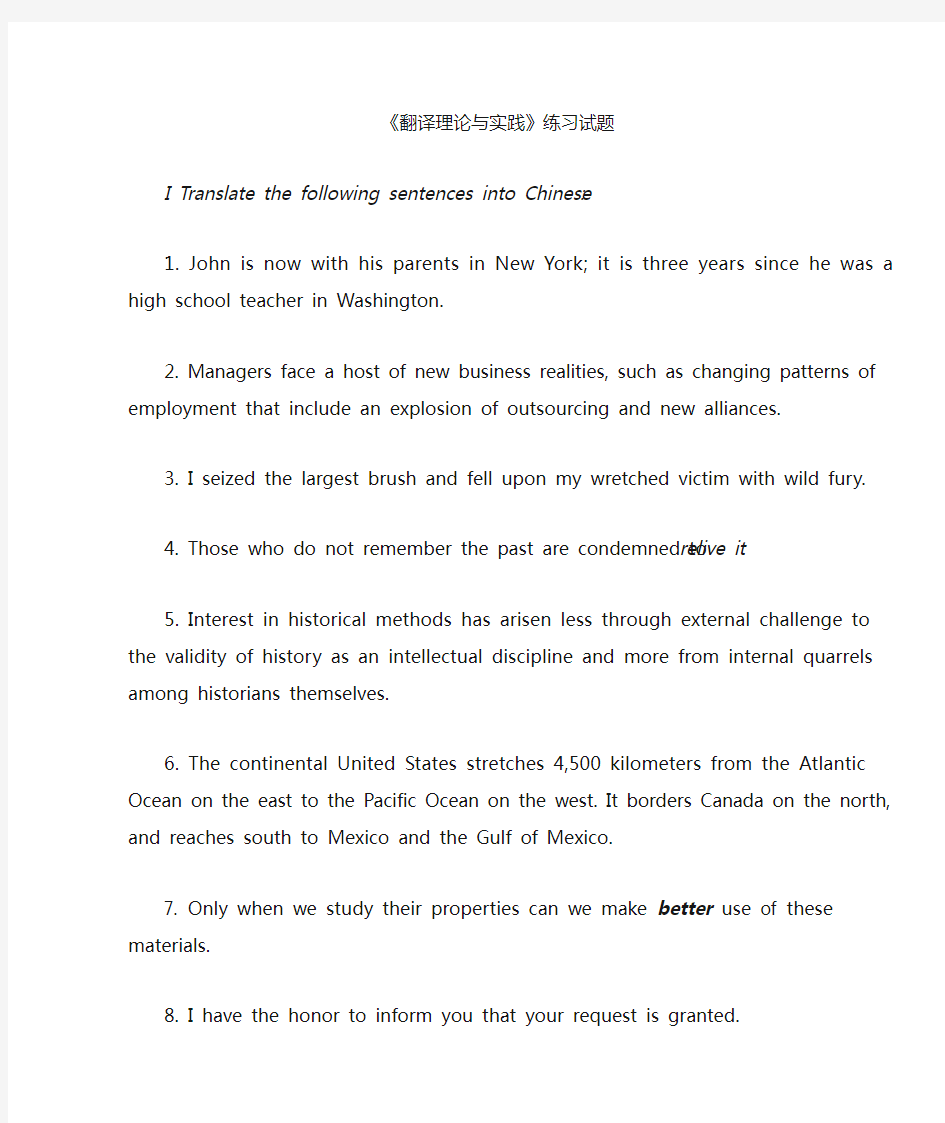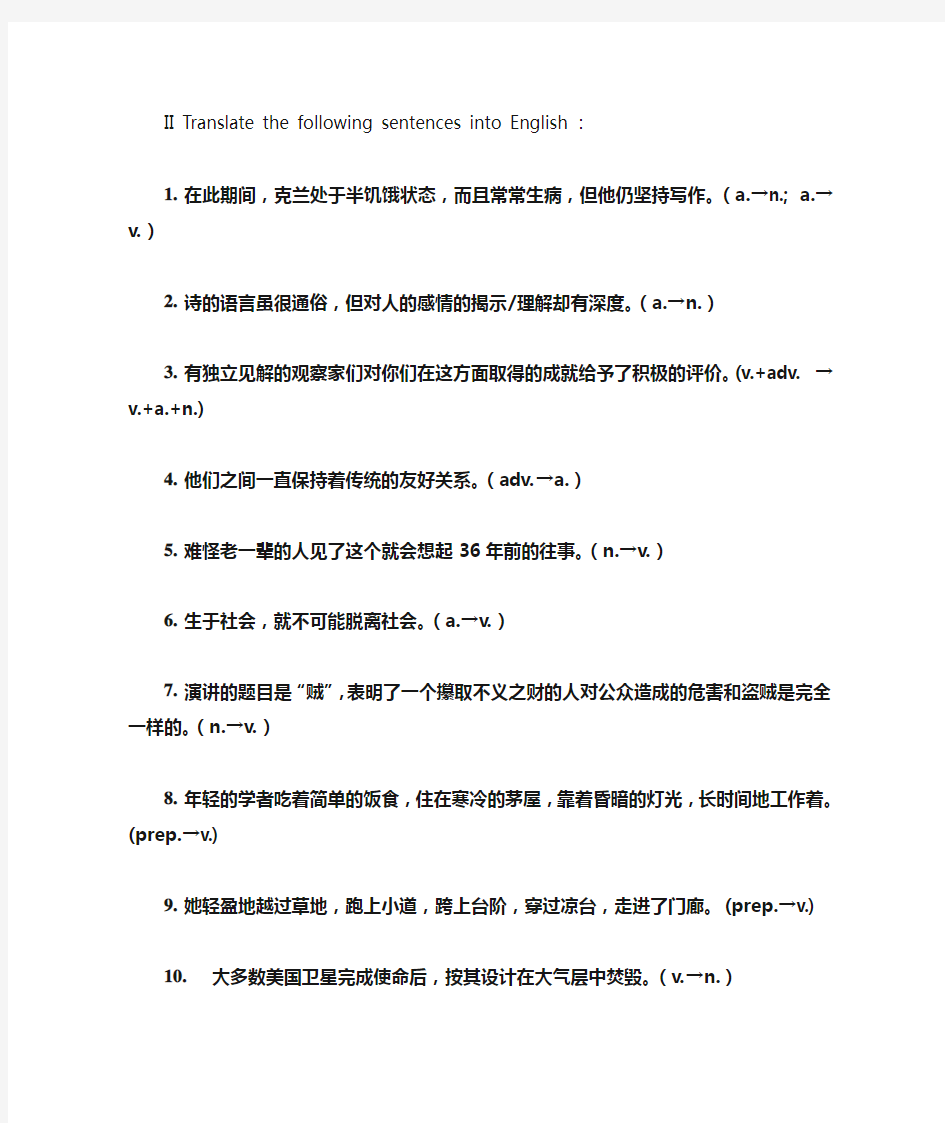《翻译理论与实践》习题


《翻译理论与实践》练习试题
I Translate the following sentences into Chinese:
1. John is now with his parents in New York; it is three years since he was a high school teacher in Washington.
2. Managers face a host of new business realities, such as changing patterns of employment that include an explosion of outsourcing and new alliances.
3. I seized the largest brush and fell upon my wretched victim with wild fury.
4. Those who do not remember the past are condemned to relive it.
5. Interest in historical methods has arisen less through external challenge to the validity of history as an intellectual discipline and more from internal quarrels among historians themselves.
6. The continental United States stretches 4,500 kilometers from the Atlantic Ocean on the east to the Pacific Ocean on the west. It borders Canada on the north, and reaches south to Mexico and the Gulf of Mexico.
7. Only when we study their properties can we make better use of these materials.
8. I have the honor to inform you that your request is granted.
II Translate the following sentences into English:
1.在此期间,克兰处于半饥饿状态,而且常常生病,但他仍坚持写作。(a.→n.; a.→v.)
2.诗的语言虽很通俗,但对人的感情的揭示/理解却有深度。(a.→n.)
3.有独立见解的观察家们对你们在这方面取得的成就给予了积极的评价。(v.+adv. →
v.+a.+n.)
4.他们之间一直保持着传统的友好关系。(adv.→a.)
5.难怪老一辈的人见了这个就会想起36年前的往事。(n.→v.)
6.生于社会,就不可能脱离社会。(a.→v.)
7.演讲的题目是“贼”,表明了一个攥取不义之财的人对公众造成的危害和盗贼是完
全一样的。(n.→v.)
8.年轻的学者吃着简单的饭食,住在寒冷的茅屋,靠着昏暗的灯光,长时间地工作着。
(prep.→v.)
9.她轻盈地越过草地,跑上小道,跨上台阶,穿过凉台,走进了门廊。(prep.→v.)
10.大多数美国卫星完成使命后,按其设计在大气层中焚毁。(v.→n.)
III Passage Translate
政治与英语
在我们这个时代,说政治文章的写作是拙劣的写作,一般是正确的。若有不适用的地方,多半是因为那位作者是某种意义上的叛逆,发表的是他个人的意见,而不是“党派调门”。不论什么色彩,凡是正统的,似乎都要求你采用一种没有生气的、鹦鹉学舌的文风。当然,小册子、社论、宣言、政府白皮书、各部次官的讲话中可以找到的政治套话,在党与党之间或有差别,但是他们在一点上都是一样的,那就是你从里面几乎永远找不出一句新鲜的、生动的、自创的话。你看着一个神态疲惫的政客在讲台上机械地重复着听熟了的话——什么bestial atrocities, iron heel, bloodstained tyranny, free peoples of the world,
stand shoulder to shoulder ——你常常会有一种奇怪的感觉,你看到的不是一个活人,而是一个假人。这种感觉有时会突然变得强烈起来-- 特别是当你看到灯光反射在演讲者的眼镜片上,使眼镜片成了空白的圆片,它后面似乎没有眼睛存在的时候。这并不是纯属幻觉。使用这种词汇的演讲者已在某种程度上把自己变成了一台机器。他的喉部固然仍旧发出应有的声音,可是他的脑子却没动,而如果由他自己选词造句的话,他就会动动脑子。如果他发表的讲话是他一遍又一遍讲惯了的话,他很可能根本不知道自己在说些什么,就像我们在教堂里应唱圣歌时口中念念有词一样。而这样意识降低的状态,对于政治上的驯服一致,如果不是不可或缺的话,说什么也是有利的。
